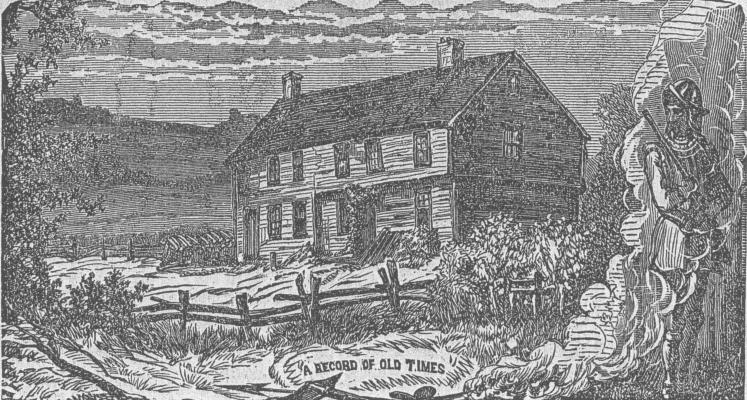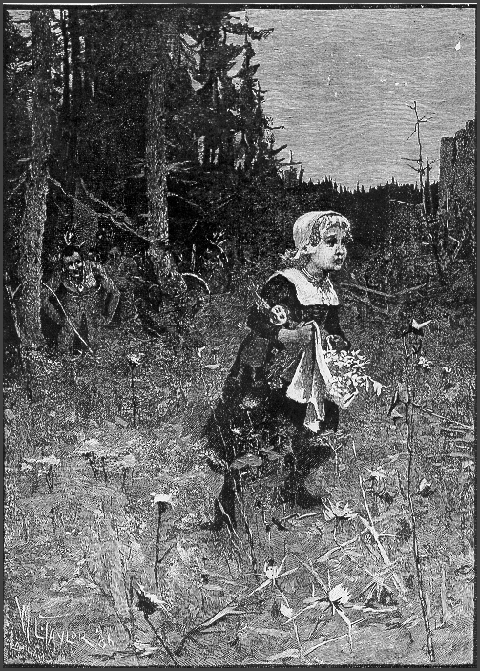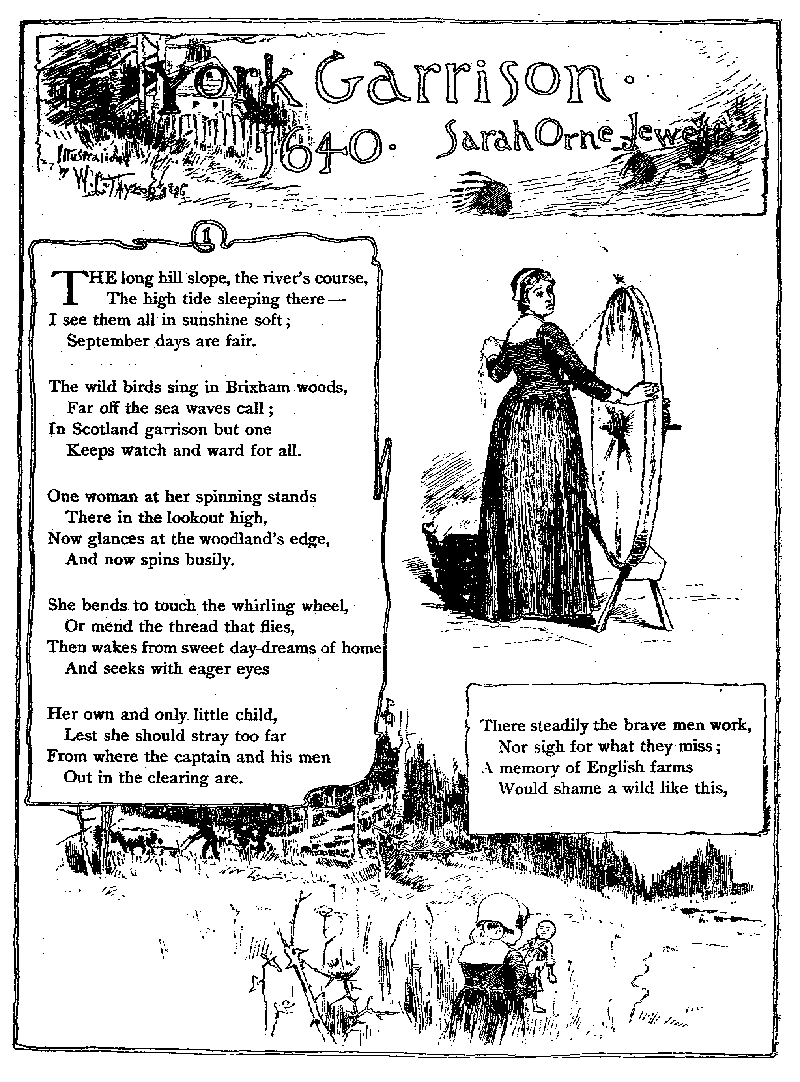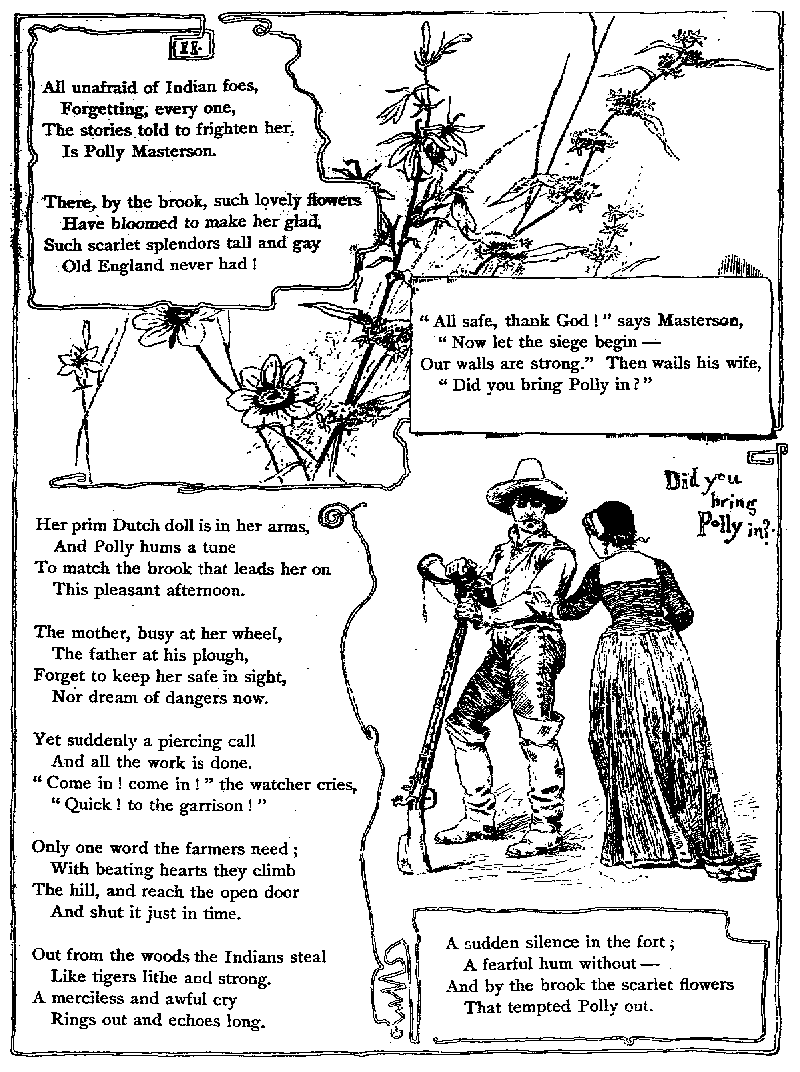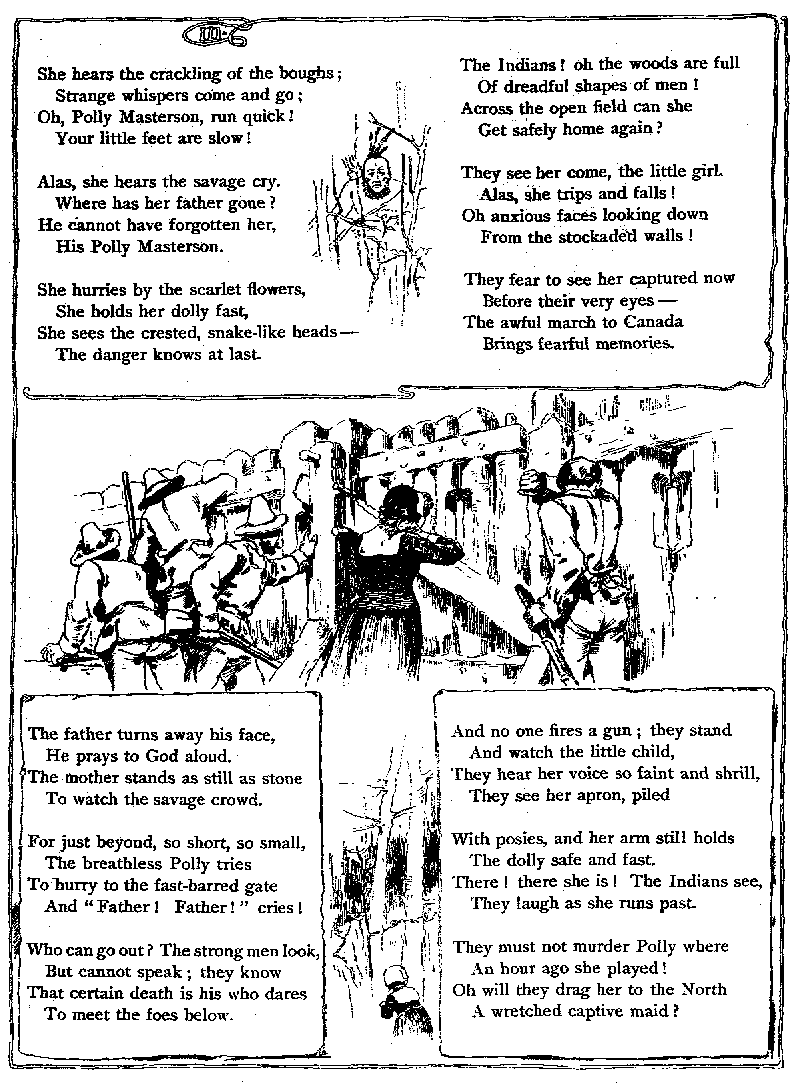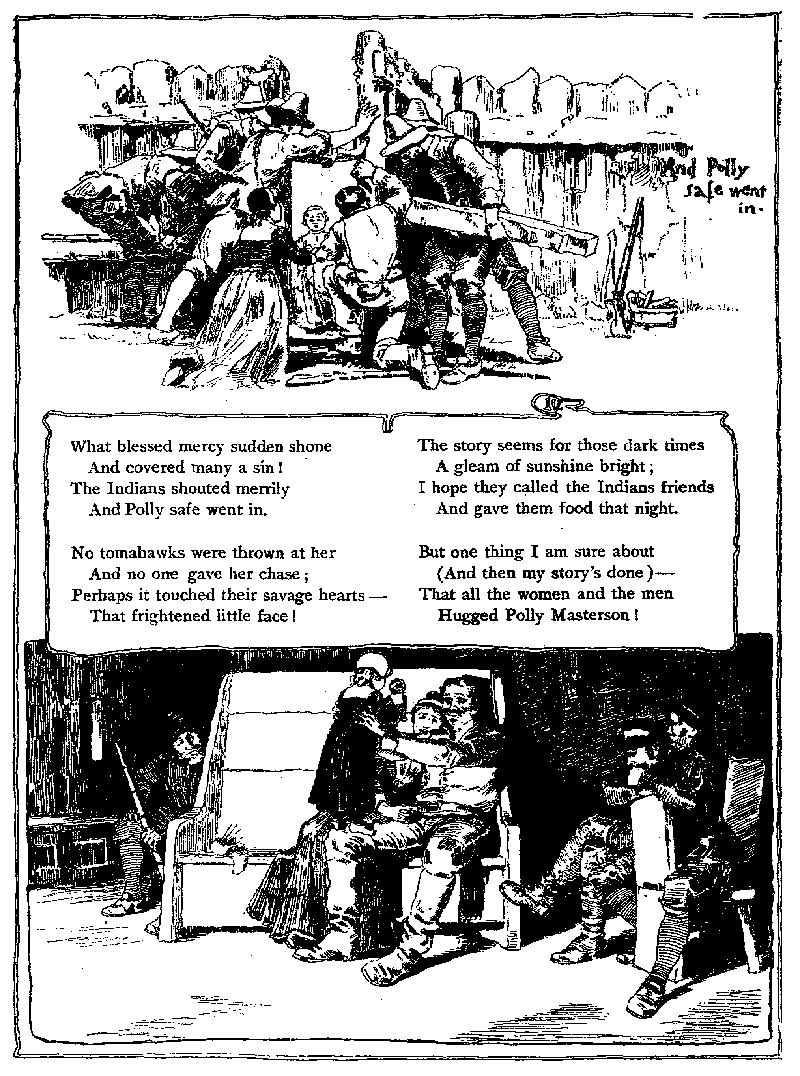Main Contents & Search
Jewett's PoemsYork Garrison: 1640
Sarah Orne Jewett This poem first appeared in Wide Awake (23:18-22) in June 1886, with elaborate illustrations by William Ladd Taylor. It was later reprinted in Ballads of Romance and History (Boston, 1887). The annotated text is followed by images of the illustrated version as it appears in the original publication.
William Ladd Taylor (1854-1926) was a popular illustrator for The Ladies' Home Journal and other magazines. Some of his best work is collected in Our Home and Country (1908). Among other Jewett works he illustrated are "Law Lane" and "Mrs. Parkins's Christmas."
York Garrison: 1640
Sarah Orne Jewett I
The long hill slope, the river's course,
The high tide sleeping there --
I see them all in sunshine soft;
September days are fair.The wild birds sing in Brixham woods,
Far off the sea waves call;
In Scotland garrison but one
Keeps watch and ward for all.One woman at her spinning stands
There in the lookout high,
Now glances at the woodland's edge,
And now spins busily.She bends to touch the whirling wheel,
Or mend the thread that flies,
Then wakes from sweet day-dreams of home
And seeks with eager eyesHer own and only little child,
Lest she should stray too far
From where the captain and his men
Out in the clearing are.There steadily the brave men work,
Nor sigh for what they miss;
A memory of English farms
Would shame a wild like this.[,]
II
All unafraid of Indian foes,
Forgetting, every one,
The stories told to frighten her,
Is Polly Masterson.There, by the brook, such lovely flowers
Have bloomed to make her glad,
Such scarlet splendors tall and gay
Old England never had!Her prim Dutch doll is in her arms,
And Polly hums a tune
To match the brook that leads her on
This pleasant afternoon.The mother, busy at her wheel,
The father at his plough,
Forget to keep her safe in sight,
Nor dream of dangers now.Yet suddenly a piercing call
And all the work is done.
"Come in! come in!" the watcher cries,
"Quick! to the garrison!"Only one word the farmers need;
With beating hearts they climb
The hill, and reach the open door
And shut it just in time.Out from the woods the Indians steal
Like tigers lithe and strong.
A merciless and awful cry
Rings out and echoes long."All safe, thank God!" says Masterson,
"Now let the siege begin--
Our walls are strong." Then wails his wife,
"Did you bring Polly in?"A sudden silence in the fort;
A fearful hum without--
And by the brook the scarlet flowers
That tempted Polly out.III
She hears the crackling of the boughs;
Strange whispers come and go;
Oh, Polly Masterson, run quick!
Your little feet are slow!Alas, she hears the savage cry.
Where has her father gone?
He cannot have forgotten her,
His Polly Masterson.She hurries by the scarlet flowers,
She holds her dolly fast,
She sees the crested, snake-like heads -
The danger knows at last.The father turns away his face,
He prays to God aloud.
The mother stands as still as stone
To watch the savage crowd.For just beyond, so short, so small,
The breathless Polly tries
To hurry to the fast-barred gate
And "Father! Father!" cries!Who can go out? The strong men look,
But cannot speak; they know
That certain death is his who dares
To meet the foes below.The Indians! oh the woods are full
Of dreadful shapes of men!
Across the open field can she
Get safely home again?They see her come, the little girl.
Alas, she trips and falls!
Oh anxious faces looking down
From the stockaded walls!They fear to see her captured now
Before their very eyes--
The awful march to Canada
Brings fearful memories.And no one fires a gun; they stand
And watch the little child,
They hear her voice so faint and shrill,
They see her apron, piledWith posies, and her arm still holds
The dolly safe and fast.
There! there she is! The Indians see,
They laugh as she runs past.They must not murder Polly where
An hour ago she played!
Oh will they drag her to the North
A wretched captive maid?IV
What blessed mercy sudden shone
And covered many a sin!
The Indians shouted merrily
And Polly safe went in.No tomahawks were thrown at her
And no one gave her chase;
Perhaps it touched their savage hearts --
That frightened little face!The story seems for those dark times
A gleam of sunshine bright;
I hope they called the Indians friends
And gave them food that night.But one thing I am sure about
(And then my story's done) -
That all the women and the men
Hugged Polly Masterson!
NOTES
The following information about the historical York Garrison is from the Michelin Guide to New England (1993). "In 1624 the Pilgrims established a trading post at Agamenticus, the present-day site of York. The small settlement that grew up around the trading post was chosen by Sir Ferdinando Gorges, the proprietor of Maine, as the capital of his vast New World territory. In 1641, Sir Gorges gave the village a city charter and renamed it Gorgeana in his honor." Gorges's plans for the area failed, and the village was reorganized as York by the Massachusetts Bay Colony in 1652. The village was several times subject to Indian attack, and was destroyed in the York or Candlemas massacre of 1692.
Jewett speaks a little of York in her historical essay, "The Old Town of Berwick," where she mentions Indian raids. However, she makes clear there that the date of this story is probably anachronistic. The Scotland Garrison almost certainly would not have had this name before 1652, when Cromwell's Scottish prisoners from the Battle of Dunbar were transported to the colonies to do forced labor. Jewett also describes the period from first settlement until 1675 in this area as characterized by peaceful interaction between Indians and settlers. Many of the details of this poem suggest that Jewett thought of it as taking place in the 1670s or after. (Research assistance, Wendy Pirsig).
"The Orchard's Grandmother," one of Jewett's stories for young readers is also set in part at a York garrison.
[ Back ]
The illustration above represents a garrison house that stood north of the current village of York, ME, along the York Road. A restored garrison house now sits at this location (see photograph below). Now referred to as the York Garrison, it was originally the Maxwell Garrison and later became the McIntire Garrison. The probable site of the "Scotland garrison" in Jewett's poem is the Masterson Garrison, which stood nearer present-day York village, on Cider Hill. (Source: Virginia Spillers, Old York Historical Society). The illustration is from Emery's Ancient City of Gorgeana and Modern Town of York (1874).
See also "Homestead Art" by the Junkins Family Association. This garrison was painted and photographed by two of Jewett's friends and correspondents: Susan Minot Lane and Emma Lewis Coleman. Lane painted it in the 1875; Coleman photographed it in 1882.
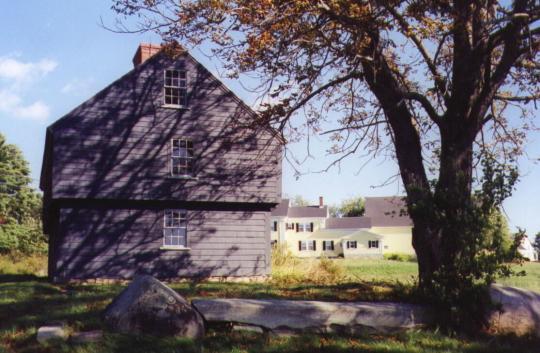
York or McIntire Garrison house, built 1707 or later, originally the Maxwell Garrison.
This restored building is believed to be the oldest in Maine.
Photographed September 2002.Polly Masterson: Jewett has used the name of a prominent early settler at York. Nathaniel Masterson was brought by his parents from Holland to Plymouth, MA in 1629. Nathaniel and Elizabeth Coggswell Masterson were settled on Cider Hill, north of present-day York village by 1671, where they raised three daughters: Sarah, Abial, and Elizabeth. Nathaniel and Elizabeth were killed in the 1692 Candlemas Day Massacre. Sarah was captured in the 1692 raid and eventually redeemed; she died in a 1703 Indian raid. Abial also was captured during the 1692 raid and later redeemed (Source: Charles Edward Banks, History of York Maine, Vol. 1, pp. 229-30).
[ Back ]
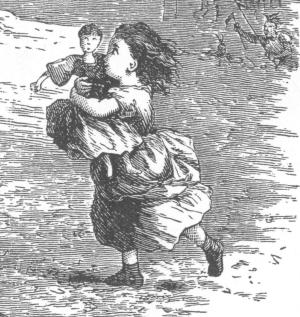
Dutch doll: A jointed wooden doll. (Research: Chris Butler).
The illustration shows the detail of Polly Brenton fleeing with her "Dutch doll" in Jewett's "The Orchard's Grandmother."
[ Back ]The awful march to Canada: Probably this reference is anachronistic. When Native Americans captured English colonists, they sometimes carried them to Canada and turned them over to the French there, but such events did not begin to take place until late in the 17th Century, as tensions grew between British and French colonies. For British colonists this increased the horror of captivity, for it would then include separation from family, the dangers to life and spirit of being in the hands of "agents of Satan" during an arduous trek through the wilderness, finally to be delivered - if one survived - into the hands of Papists and enemies of England. For further discussion and examples, see Puritans among the Indians, edited by Alden T. Vaughan and Edward W. Clark, Cambridge: Harvard UP, 1981. See also "The Old Town of Berwick," in which Jewett summarizes a story of Indian captivity from the French and Indian Wars.
[ Back ]
York Garrison: 1640
Images of the Original Publication
Edited and annotated by Terry Heller, Coe College.
Main Contents & Search
Jewett's Poems
